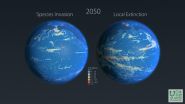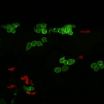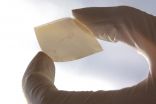Clues to inner atomic life from subtle light-emission shifts
Hyperfine structure of light absorption by short-lived cadmium atom isotopes reveals characteristics of the nucleus that matter for high precision detection methods
2015-07-01
(Press-News.org) Atoms absorb and emit light of various wavelengths. Physicists have long known that there are some tiny changes, or shifts, in the light that gets absorbed or emitted, due to the properties of the atomic nucleus. Now, a team of scientists has elucidated the so-called hyperfine structure of cadmium atoms. Relying on a method called laser spectroscopy, they have measured variations in the energy transition within cadmium atom - Cd in the periodic table. They studied a chain of isotopes with an odd number of neutrons ranging from 59 in 107Cd to 75 in 123Cd. From these high-precision measurements, they were able to identify the physical cause of the shift within the nucleus. These findings by Nadja Frömmgen from the Johannes Gutenberg University Mainz, in Germany, and international colleagues have now been published in EPJ D.
Two main factors influence the cadmium atom's hyperfine structure. First, electrons orbiting the nucleus create a magnetic field resulting in a force affecting the nucleus, and splitting its absorption and emission line into a number of finer lines. Second, there are influences from the way the charge is distributed within the nucleus - a quantity known as the nuclear electric quadrupole moment, which only appears for non-spherical distributions. Some nuclei are shaped like a rugby ball, a frisbee or even a pear.
A peculiar outcome of this study of Cd's hyperfine structure was the observation of a very regular anomaly in the magnetic distribution inside the nucleus - previously observed only in mercury - pointing to a possible general feature of nuclei.
The nuclear properties identified from such precision measurement have both theoretical and practical implications in astrophysics, nuclear and plasma physics. They are also important for detection methods such as atomic, chemical and solid-state spectroscopy, as well as nuclear magnetic resonance.
INFORMATION:
Reference:
Nadja Frömmgen, D. L. Balabanski, M. L. Bissell, J. Biero´n, K. Blaum, B. Cheal, K. Flanagan, S. Fritzsche, C. Geppert, M. Hammen, M. Kowalska, K. Kreim, A. Krieger, R. Neugart, G. Neyens, M. M. Rajabali, W. Nörtershäuser, J. Papuga, and D. T. Yordanov (2015), Collinear laser spectroscopy of atomic cadmium, Eur. Phys. J. D 69: 164, DOI 10.1140/epjd/e2015-60219-0
ELSE PRESS RELEASES FROM THIS DATE:
2015-07-01
A good night's sleep has long been recommended to those who have experienced a traumatic event. But an Oxford University-led study provides preliminary experimental work suggesting it could actually be the wrong thing to do.
The research, conducted in Oxford's Wellcome Trust-funded Sleep and Circadian Neuroscience Institute (SCNi) and published in the journal Sleep, showed that sleep deprivation might prevent people from consolidating memories of experimental trauma (emotional film clips in the study), reducing their tendency to experience flashbacks.
Dr Kate Porcheret, ...
2015-07-01
(SACRAMENTO, Calif.) -- Soldiers injured during the conflicts in Iraq and Afghanistan have the highest survival rates in history, thanks to the availability of surgeons skilled in combat care. But combat-ready surgical skills are hard to sustain off the battlefield.
"A lot of knowledge builds up in the military medical enterprise during times of war," said Joseph Galante, who chairs the UC Davis Division of Trauma, Emergency and Critical Care Surgery and is a commander in the U.S. Navy Reserves. "When peacetime comes, that knowledge can slide. We need to identify ways ...
2015-07-01
The global supply of seafood is set to change substantially and many people will not be able to enjoy the same quantity and dishes in the future due to climate change and ocean acidification, according to UBC scientists.
These findings were released today in Japan by the Nereus program, an international research team led by UBC scientists and supported by the Nippon Foundation. The Nereus program was formed to study the future of the world's oceans and seafood resources. Today it released a summary of the first phase of its research in a report titled 'Predicting Future ...
2015-07-01
ASCO Perspective: Gary Schwartz, MD, ASCO Expert "This study adds to the growing discussion around food and cancer risk. While the findings are intriguing, it's far too soon to recommend any broad changes to grapefruit or orange consumption. Until conclusive data are available, we should continue to be cautious about protecting our skin from sun exposure."
A new analysis of dietary patterns among more than 100,000 Americans suggests that frequent consumption of citrus -- namely whole grapefruit and orange juice -- may be associated with an increased risk of melanoma. ...
2015-07-01
July 1 -- Researchers in the United Kingdom and Denmark have studied the "see-through" larvae of zebrafish to reveal how wound healing leads to skin cancer. Live imaging shows neutrophils, the protective inflammatory cells of the body's immune system, diverted from an induced wound to any nearby precancerous skin cells. The newly arrived neutrophils cause rapid division of these skin cells, which may cause them to progress to melanoma. The results are published in The EMBO Journal.
"Our results provide direct visual evidence of a physical link between wound-associated ...
2015-07-01
Scientists from the University of Leeds and The Institute of Cancer Research, London, have discovered a new protein which triggers the growth of blood vessels in breast cancer tumours which have spread to the brain, a common location which breast cancer can spread to.
Dr Georgia Mavria's team in the School of Medicine at Leeds found that by withholding the DOCK4 protein in mouse models, a particular part of the blood vessel did not form as quickly, meaning tumours grew at a slower rate.
Dr Mavria said: "We want to understand how these tumours form and grow, but we still ...
2015-07-01
Storing solar energy as hydrogen is a promising way for developing comprehensive renewable energy systems. To accomplish this, traditional solar panels can be used to generate an electrical current that splits water molecules into oxygen and hydrogen, the latter being considered a form of solar fuel. However, the cost of producing efficient solar panels makes water-splitting technologies too expensive to commercialize. EPFL scientists have now developed a simple, unconventional method to fabricate high-quality, efficient solar panels for direct solar hydrogen production ...
2015-07-01
Nine times more job offers after training
Eases anxiety and boosts rapport with interviewer
High unemployment for vets with PTSD and mentally ill
CHICAGO --- Finding a job is difficult for veterans with posttraumatic stress disorder (PTSD) and individuals with severe mental illness, who have high unemployment rates even though many want to work.
The job interview -- especially hard for those with mental illness -- can be a major hurdle.
A virtual human -- based on software originally used to train FBI agents -- helped vets with PTSD and individuals with severe ...
2015-07-01
This news release is available in French.
Regular, structured extracurricular sports seem to help kids develop the discipline they need in order to engage effectively in the classroom, according to a new study led by Linda Pagani of the University of Montreal and its affiliated CHU Sainte-Justine children's hospital. "We worked with information provided by parents and teachers to compare kindergarteners' activities with their classroom engagement as they grew up," Pagani said. "By time they reached the fourth grade, kids who played structured sports were identifiably ...
2015-07-01
COLUMBUS, Ohio - Seven out of 10 college students feel stressed about their personal finances, according to a new national survey.
Nearly 60 percent said they worry about having enough money to pay for school, while half are concerned about paying their monthly expenses.
The findings suggest that the pressures of student loan debt and finding ways to make ends meet are weighing on America's college students, said Anne McDaniel, co-author of the study.
In fact, 32 percent of students reported neglecting their studies at least sometimes because of the money they owed.
"The ...
LAST 30 PRESS RELEASES:
[Press-News.org] Clues to inner atomic life from subtle light-emission shifts
Hyperfine structure of light absorption by short-lived cadmium atom isotopes reveals characteristics of the nucleus that matter for high precision detection methods



